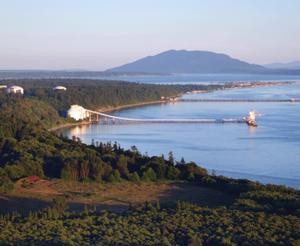It was barely two weeks ago that we reported on the Army Corps of Engineers’ decision to “fast track” approval of the Morrow Pacific Project, a coal export terminal on the Columbia River that would move over 8 million tons of coal from rail to barge every year.
This Morrow Pacific Project is one of a handful of proposed export terminals that the industry hopes to build to help link coal from the strip mines of the Powder River Basin to overseas markets. As American demand for coal falls, companies (many foreign owned) are scrambling to access the growing Asian markets.
At issue with the export terminals is the process of review and approval, specifically with regard to the environmental impacts. As we wrote about the Morrow Pacific Project, the Army Corps has, at present, the final word in determining whether or not a terminal can be built. This is due primarily to the “dredge and fill” rules established in section 404 of the Clean Water Act, and the origin of Army Corps decisionmaking harkens all the way back to the Rivers and Harbons Appropriation Act of 1899.
Here’s the problem: in determining whether or not to approve a new facility such as a coal transfer terminal, the Army Corps is only compelled legally to look at the immediate environmental impacts at the site itself. These site-specific reviews wouldn’t take into account any broader of cumulative impacts, like, say, the impacts of coal dust along the route of the rail or barge traffic, nor the even broader and inevitable impacts of the coal’s combustion on mercury pollution and global climate disruption.
Many – including local environmental and community groups, Oregon Governor John Kitzhaber, and the U.S. Environmental Protection Agency (EPA) – have called for just this sort of broader review that would look at all public health and environmental impacts.
Back in April, the E.P.A. issued an eye-opening public comment that warned of “significant impacts to public health,” as well as the “cumulatively significant impacts” of climate change and the drift of particulates, mercury, and ozone from Asia to the United States. The agency called for a full, programmatic Environmental Impact Statement under the National Environmental Policy Act (NEPA).
Apparently, this inter-agency rift raises some concern in the White House. According to this deeply-reported article by Bloomberg BNA, the White House Council on Environmental Quality (CEQ) convened a meeting in August to address the approval process.
According to Bloomberg BNA reporter Paul Shukovsky:
The CEQ email convening the Aug. 10 meeting was written by Horst Greczmiel, the CEQ‘s associate director for NEPA oversight. It makes no mention of whether the apparent policy differences between the EPA and the corps would be addressed. But the email does call for a discussion of issues surrounding one of the proposed projects as an example of how the administration would proceed “as we move forward with additional [permit] applications, lease sales, mining operations, and potential rail improvements.”
At this point, it’s impossible to tell what role, if any, other agencies like the E.P.A. or state-level environmental offices will have in the ultimate determinations on the coal export terminals. On its end, an Army Corps spokesperson told Bloomberg BNA that “the corps is still considering whether to conduct an area-wide side EIS to look at the collective cumulative impacts of all the projects.”
On a project-by-project basis, however, it seems as if local demand, directed at statewide agencies and the Army Corps, can help force a broader environmental review.
The Gateway Pacific Project, for instance, has just entered its public review process. There, the Army Corps, the Washington Department of Ecology, and Whatcom County are together preparing an EIS for that specific project. The first public hearing on the Gateway Pacific will be on October 27 in Bellingham, Washington.
Subscribe to our newsletter
Stay up to date with DeSmog news and alerts






